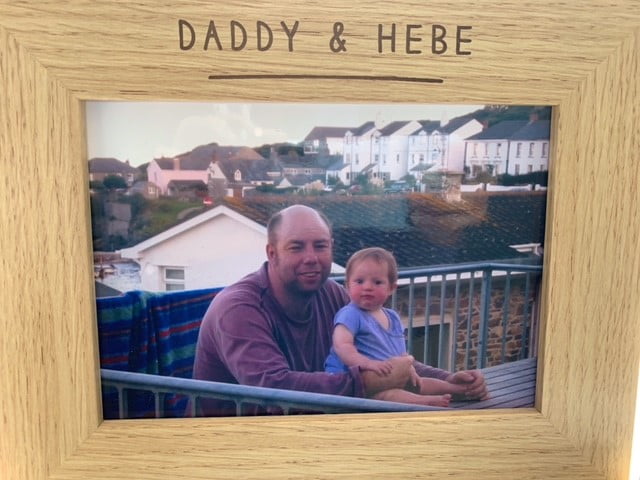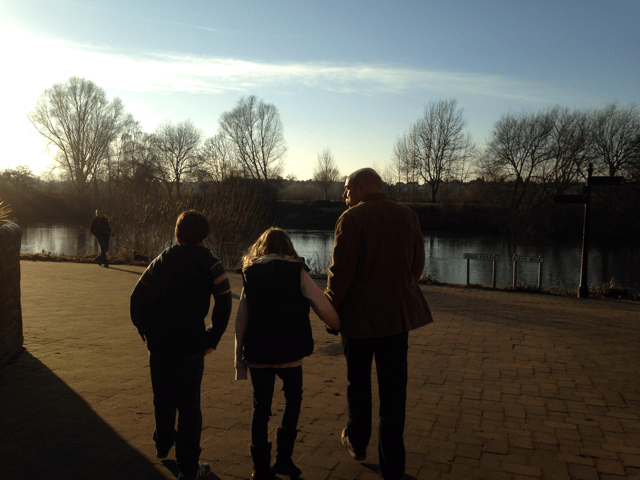How do people celebrate death around the world?
One thing we all have in common is life and death. There are lots of different traditions to mark the occasion of a person dying.
Hebe was just 13 when her dad died by suicide. She shares ways she has found to cope with her grief and remember her dad.
Grief is often described as a ‘rollercoaster’ and I particularly felt this after my dad died. I could still have a laugh with my friends, but there were periods of complete despair as I craved to see him just walk through the door or to hear his voice.
One of the biggest challenges was returning from school. I found it awkward with teachers and friends because it felt like everyone viewed me differently. This did disappear, but only with time. I also found school hard because I didn’t see how I could just carry on with life like I did before. It’s hard to accept that life has to go on without them and they won’t be in any new memories.
However, looking back on my journey so far I’ve developed hugely as a person. I’ve learnt skills of perseverance, resilience and also independence. Living with only one parent is an adjustment I still feel today. It can be challenging to receive the same support and attention, particularly when your only parent is equally caught up in the whirlwind of grief.
To help my mum with the single-parent strains I began to cook because my dad had done most of the cooking previously. This new hobby really helped to distract me from the consuming feeling of grief while also giving me a sense of responsibility and purpose. I found it unbearably hard to watch my mum cope with the aftermath of suicide. Cooking allowed me to help, when I couldn’t relieve her pain.

What helped you with your grief?
1. Taking some time out and getting away
There are a lot of things that I’ve found have helped with my grief. A few weeks after my dad’s death we went to Gorran Haven in Cornwall where we’d gone many times with my dad. It was strange to go without him for the first time, but I found the trip really helpful. Following my dad’s death there were always people in the house, from neighbours to solicitors. This trip gave us the chance to escape from everyone so we could get away from it all.
Each morning, I’d go out early when nobody else was around to sit on the quay where my dad and I used to. It gave me space to think and process my emotions while I watched the peaceful waves. It sounds strange, but I felt as though he’s watched the same calming waves, and as I watched them we were connected again.
2. Writing a eulogy for my dad’s funeral
During our trip to Cornwall, I decided to write a eulogy for my dad’s funeral. To be completely honest, I had no clue what a eulogy would entail! But I was determined to show people that just because my dad died by suicide, it didn’t mean he wasn’t an incredibly loving dad.
Looking back on doing my speech, I still can’t comprehend where I found the strength. It was incredibly hard seeing my dad’s coffin and then having to speak. However, it gave me so much. I felt empowered. I’d found my voice again to show that my dad shouldn’t be defined by his death but by his joy and laughter. Some people think that suicide is a selfish act however, the eulogy gave me closure because I was able to voice how compassionate and caring he was.
3. Finding ways to feel connected to my dad
Something else that’s helped the aching grief was getting personalised cremation jewellery so I can wear his ashes. It makes me feel as though a little bit of my dad is always with me.
Another thing that’s helped is listening to my dad’s music and running which is something we used to do a lot together. When I run, it gives me the sense of connection that I sometimes desperately long for. Just for a moment I feel like he’s there alongside me.
Although these things help, frustratingly I feel that time is one of the biggest healers. The pain never truly goes away but it gets easier to cope with and you begin to learn to live without them.

4. How do you cope with anniversaries and birthdays?
On anniversaries, my mum, my brother and I go to where his ashes are scattered and the place he died. We pour a bottle of beer for him and scatter his favourite homemade Welsh cakes. It’s a hard day and I often think about the suicide and life before his death. We all just have a quiet day together and I usually read his letters too.
I do find Fathers Day slightly challenging as everyone is with their dad and I’m left to remember. Personally, I try to avoid the social media bombardment on Father’s Day. I just look over old memories and go to where his ashes are scattered to sit with him. I like to do the same on his birthday however, my mum and brother prefer to do other things so we have to figure out what suits us all.
What is your advice to other young people?
My advice to other young people who’ve lost a parent would be that however you feel, just know that it’s ok. This awful feeling doesn’t last forever. I’m not saying the ache of grief every fully ends, but it gets easier and life does go on. You may feel so alone but just remember that there are lots of people who have been through similar situations and there are people who can help (such as Winston's Wish).
Talking to your family and others can be really helpful, especially to keep the person’s memory alive. I’m still working on being able to talk openly about how I feel, which would have been much easier if I hadn’t bottled it up to begin with. By talking with your family you will become closer which really helps to create your new family unit.
Finding ways to remember them in enjoyable ways has really helped me, such as listening to his favourite songs and wearing my cremation jewellery. Visiting where they were buried or their ashes were scattered really helps too.
Most of all, don’t put any pressure on yourself. You are going through trauma so be kind to yourself.
Talk Grief is powered by Winston’s Wish, a childhood bereavement charity that supports grieving children and young people up to 25. If you want to talk to someone about your grief, call us on 08088 020 021 (open 8am-8pm, weekdays), email ask@winstonswish.org or use our online chat (open 8am-8pm, weekdays). For out of hour mental help support, text WW to 85258 to speak with someone from our trusted partner, Shout. For urgent support in a crisis, please call 999.


One thing we all have in common is life and death. There are lots of different traditions to mark the occasion of a person dying.

Hear from Natasha, Youth Ambassador, about how reading helps her process her bereavement.

Bereavement support tips for those who identify as part of the LGBTQ+ community. Tap the live chat button or scroll down to find ways to contact Winston's Wish for further support.

Discover ways to store memories of your parents and express how you're feeling in your grief.

Find ways to cope with grief and its emotions as a teen or young adult without their parents.

Winston's Wish Bereavement Support Workers share top tips for looking after your mental health when you're grieving.

Feeling confused by your grief? You're not alone. Our Bereavement Support Team share some reasons why it can be confusing.

Over winter, with the darker evenings, feelings of loneliness can seem more overwhelming than ever.

Iman, Youth Ambassador, shares how she grieves at Christmas even though she doesn't celebrate the occasion.

Crying is a normal response when your person has died, no matter how long ago. There's no right or wrong way to grieve, and it's okay to let it out.

A guide for grieving young people from the Winston's Wish Bereavement Support Team.

Three of our Youth Ambassadors, Anna, Libby and Angharad, reflect on their first Christmas without their person.

Winter and the Christmas holidays can be a difficult time of year. Here are five ways to remember your person this season.

Winston's Wish Bereavement Support Workers share their 8 top tips for bereaved teens and young adults through the colder months.

Youth Ambassadors share the ways they remember their person digitally, through photo albums, playlists, and more.

Youth Ambassadors, Daisy, Freya, and Katie, share their personal views of their own secondary losses as a result of their bereavement.

Hear from some of the Youth Team about times when their teachers have helped them with their grief.

Some tips for taking care of yourself when you're grieving for a celebrity or public figure.

Our Bereavement Support Team have written some guidance on how to manage grief when you feel like you aren't able to be open.

Lilly shares an introduction to her grief experience and why it's so important to her to be a Winston's Wish Youth Ambassador.

Hear from some of their Youth Team about how they found support at uni.

Angus, Content Creator, says, "This message is about embracing change and not letting current moments pass you by."

Coping strategies to support you after a teacher has died

Tips from our bereavement support team to help you with big life changes like moving out as a young adult.

Useful tips to help you understand and cope with your grief.

Feeling sad that your person isn't there, guilty that you're celebrating your results, or proud of yourself for your results. There's no right or wrong way to grieve.

It can be very difficult knowing what to say and to be around someone who has experienced the death of someone close. Adults find it difficult too, so try not to feel bad about this.

The death of a friend may feel extremely difficult and can feel as significant as that of a family member. Whatever you're feeling is valid, and there is no right or wrong way to grieve.


Jack, Content Creator, writes about how managing his grief through running has led to him winning the Leeds Half Marathon 2024!

Iman, Youth Ambassador, explains about Eid and shares what it's like for her and her family to grieve during Eid.

Miranda shares about how she uses music in different ways to help express her grief and emotions.

Ashleigh writes about how both writing and music have helped her in her grief.

The Winston's Wish bereavement support team share top tips for managing grief this Father's Day.

Grace's dad died from cancer when she was eight years old, she shares how she remembers her dad on Father’s Day.


Feelings of worry are very normal when you're grieving. Read on to discover some ways to manage these feelings.

Useful tips for exam season if you're grieving

Youth Ambassador, Iman, shares about her Eid celebrations as a grieving young person

Content Creator, Angus shares his thoughts

Useful tips for exam season

Interview with Mark O’Sullivan, writer of Tell Me Everything

Tips to help improve your sleep when you're grieving

How poetry can be a useful way to express your feelings

Young people share what it's like to grieve while studying at uni.

Our bereavement experts are available to speak to for immediate support on weekdays from 8am to 8pm.

Get top tips from bereavement experts, and hear from Youth Ambassadors, Henri and Teigan, about their experiences of Mother's Day.

Phoebe's mum died when she was nine. She shares how she feels on Mother’s Day and how she remembers her mum.


































